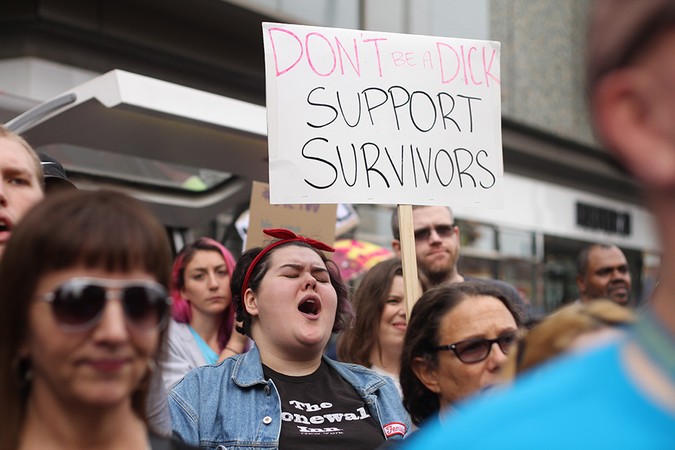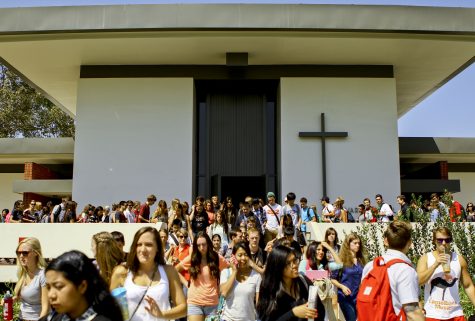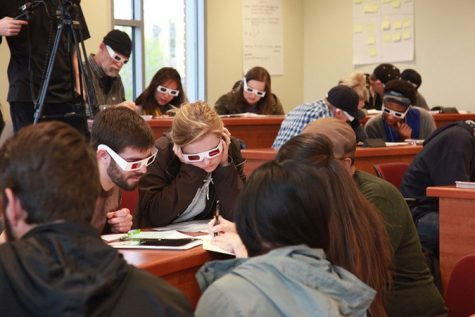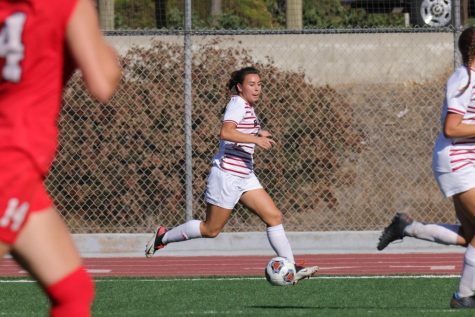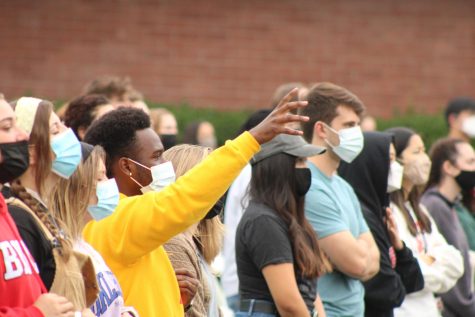Survivors speak out
Thousands attend the #MeToo Survivor’s March and rally.
November 14, 2017
“I’m over being polite about rape. It’s been too long now. We have been too understanding. We need it to end now,” actress Frances Fisher’s voice echoed through the microphone into the streets of Hollywood, where thousands of women and men stood wearing shirts, pins, hats or signs reading “Me Too.”
Over the amber Walk of Fame stars, thousands of women and men marched and rallied as a part of the #MeToo Survivors’ March on Sunday in solidarity with those sexually assaulted or harassed.
“I knew it wasn’t my fault, and I knew that it was wrong. And even then I still had all of these feelings that I was to blame and I had a part in it,” said Camille Demano, an attendee of the march. “So that’s why I want to come out and just give support to other survivors and the more people that are here the more that people outside will know that it’s a real issue and needs attention.”
#METOO CAMPAIGN
The march took place as a response to the #MeToo social media campaign, which became popular after the Harvey Weinstein sexual allegations came out and actress Alyssa Milano encouraged anyone affected by sexual assault or harassment to post the hashtag #MeToo on social media. Several nonprofit social justice organizations played a part in planning the event, such as Indivisible Suffragists, California for Progress, Defend Movement, AF3IRM and the HEART Women & Girls Project.
“It’s just like part of the process of societal transformational change for us to continually have these conversations and really not let them fall to the back again,” said Barbra Ramos, a member of the Los Angeles AF3IRM, a transnational feminist organization. “We want it so society changes in such a way that no one has to say me too any more because violence and sexual violence and harassment have gone down.”
One of the key speakers and planners was Tarana Burke, the founder of the original “Me Too” movement. Before “Me Too” went viral from Milano’s post, the movement had a rich 10-year-long history. Burke began the movement as an anti sexual abuse campaign in order to help women and girls who had endured trauma. Since then she has done immense amounts of work in advocating for women.
A POSITIVE CHANGE
Laius Vaidya, a survivor, attended the march in support of fellow women, expressing her approval that people finally had started opening up in large scales about issues of harassment. She described the difficulty women in her baby boomer generation faced regarding the stigma of speaking up. As a previous high school teacher, she always made an effort to teach her female students to protect and value themselves.
“Why did I come today? Because I’m so sick of this. I’m so disgusted and sick of it. I’m also really happy it’s coming out. I mean finally,” Vaidya said. “It’s taken a long time because… being sexually harassed was so much a part of our experience in my generation. We simply took it for granted. I could give one example after another example after another example.”
In the last few weeks, many more stories of powerful men sexually assaulting women have surfaced as women found courage to speak up through the community of the #MeToo campaign. These stories have shown that the issue does not limit itself to Hollywood, but pervades every industry, including college campuses.
SUPPORT ON COLLEGE CAMPUSES
Students at Biola believe the #MeToo campaign helps confront the issue of sexual assault and pertains to students because of the prevalence of sexual assault on college campuses. They also see its similarity with justice campaigns Biola has done in the past.
“I think [the #MeToo campaign] relates to what we do at Biola with the “It’s On Us campaign,” said Christine Godzich, senior biological sciences major. “I think it’s a subject that just deserves to be resurfaced since it’s really hard for females to already talk about that.”
The #MeToo campaign can help those who have suffered from sexual assault, harassment and sexism to feel they have a community, and it can push society to make a change in businesses, homes and college campuses.
“It is a good way for females to get their voice out and be heard and stuff because it’s such a vulnerable topic,” said Brenna Khaw, junior journalism major. “Just let’s people have a voice.”
During the rally, a student from Occidental College came to the platform, sharing the pain she endured after getting sexually assaulted at her college and advocating for change on college campuses. Sexual assault on college campuses have grown rampant in this age, as seen from cases such as the Broch Turner trial. Even Biola’s campus feels the threat of rape due to the sexual assault reports seen in the past few years.
As Fisher said to the crowd, “I am over college campuses being places young women survive rather than places they thrive because of rape culture.”


